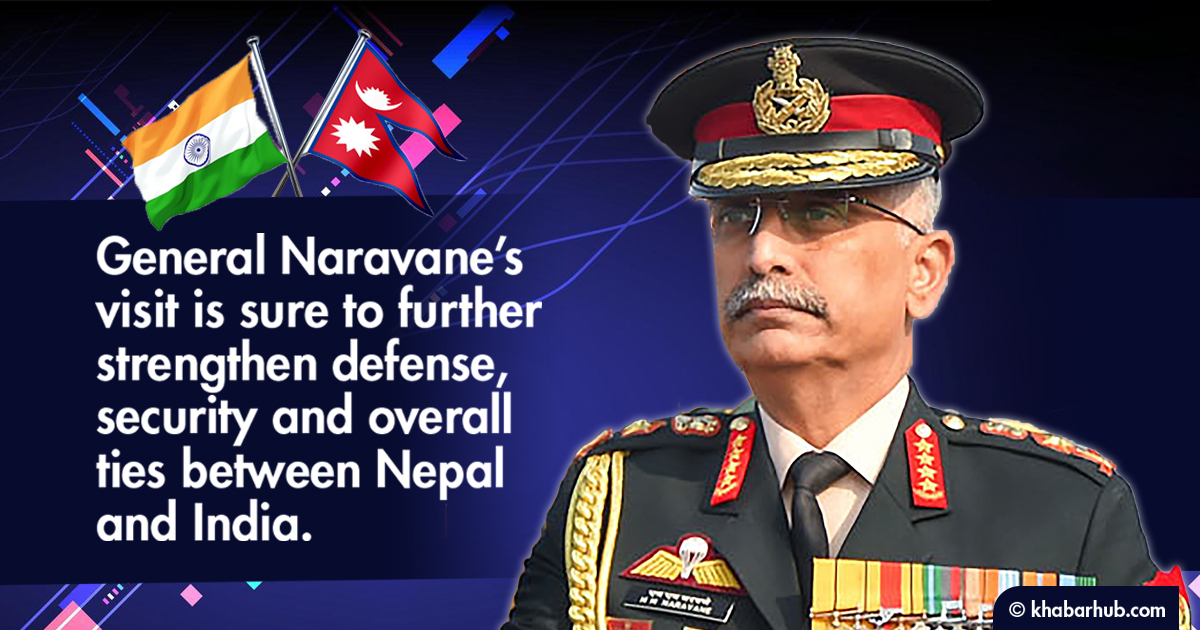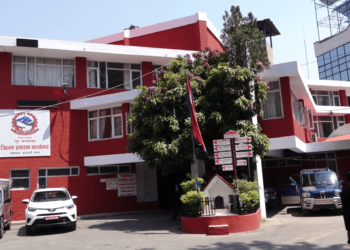KATHMANDU: As a display of special bonding between two democratic countries, and the deep-rooted military ties, Indian Army Chief, General Manoj Mukund Naravane, is arriving in Nepal on Wednesday on a three-day visit.
General Naravane will be conferred with the honorary title of Nepali Army chief – a historic tradition of displaying a unique closeness between Nepal and India.
The visit, observers say, symbolizes the deep-rooted military to military ties and will be a platform to further strengthen the defense cooperation between the two armies.
Nepali Army (NA) Brigadier General Santosh Ballav Paudel, also the NA Spokesperson, said, “General Naravane will be conferred with the honorary title of Nepali Army chief.”
He terms the custom a “historic tradition of displaying special bonding between the two neighbors.” According to him, the tradition dates back to 1950 when the then chief of Indian Army, General Kodandera Madappa Cariappa visited Nepal then.
Likewise, according to Paudel, Nepal’s Surendra Bahadur Shah was conferred with the title in 2026 BS in India.
The visit, security experts here say, will help at strengthening defense, security and overall ties between the two neighbors.
President Bidhya Devi Bhandari will confer him with the title of honorary chief of the Nepali Army (NA) – a historic tradition of displaying special bonding between the two nations.
Nepal and India have a tradition of conferring the honorary title to each other’s army chief since 1950.
Earlier in 2017, Indian Army Chief General Bipin Rawat was conferred with the title of honorary General of the Nepal Army by President Bhandari.
It should be noted that Nepal’s General Purna Chandra Thapa, too, had received a similar honorary ranking by India in January 2019.
The visit is expected to shake an extended hand of friendship from both sides to restore the age-old relationship between two close nations, according to security experts.
“The visit was approved by the Government of Nepal in February this year but was postponed due to the lockdown in both countries after the outbreak of the Covid-19 pandemic,” said Paudel.
General Naravane’s visit is seen with importance as it is the first high-level visit from India in the last one year.
Observers hope that the visit will turn out to be a new dawn in the relations as the two countries have a shared history, shared culture, shared religion, and shared geography.
They have also expressed the optimism that this is also very much expected to formally bury any differences between the two close nations.
During his visit here, General Naravane will meet with his Nepali counterpart, General Purna Chandra Thapa besides paying a courtesy call on Prime Minister KP Oli, who also holds the defense minister’s portfolio.
“He will pay homage at the martyrs’ memorial at the Army Pavilion, receiving a guard of honor in the Army Headquarters, holding meetings with his Nepali counterpart General Purna Chandra Thapa and addressing student officers at the Army Command and Staff College, Shivapuri,” the Nepali Army said.
The visit is expected to shake an extended hand of friendship from both sides to restore the age-old relationship between two close nations, according to security experts.
General Naravana’s visit needs to be taken positively in a bid to pave the way towards resolving all outstanding issues and building relations of trust between the two neighbors to further strengthening the bonding as well as the military ties, according to Binoj Basnyat, Major General (Retd.) of the Nepal Army.
He is of the view that the practice of giving honorary titles is important and meaningful as it confirms the close ties between NA and the Indian Army.
The Gurkhas are best known for their history of bravery and strength in the Indian Army’s Gurkha Regiment and the British Army’s Brigade of Gurkhas.
Former Chief of Army Staff of Nepal Army Rukmagad Katuwal says that the honorary title will support in further enhancing the understanding between the two neighbors.
Katuwal says, “The honorary title will be given mainly to support the sensitivities of the two nations. It increases the tolerance of both nations. This is a kind of respect.”
According to him, this kind of respect plays a vital role in resolving internal problems between the two countries.
Here’s what Basnyat adds: “The tradition of giving honorary titles to the Chief of Army Staff is to show that there is a cordial relationship between the Nepali Army and the Indian Army.”
By saying so, he feels that the tradition of conferring with the title demonstrates the significance of cordial relations between the two countries.
Nepali Army Spokesperson Paudel, meanwhile, says the tradition of awarding honorary status to the commanders of Nepal and India is a historic one.
“Honorary titles are conferred to recognize the relationship between the armies of one country and the armies of another country to maintain relations between the two nations.”
Paudel says a cordial relationship between the armies of the two countries signifies smooth relations between the two countries. “This is evident that the relationship between the two countries is quite strong.”
Likewise, security expert Geja Sharma Wagle says the honorary title holds a significant meaning.
Wagle says it reflects the convivial relationship between the Nepali Army and the Indian Army.
“Such a title helps improve the relations between the armies of the two countries. In this way, when the relations between the armies of the two countries are smooth, the relations between the two countries are sure to be cordial.”
Security expert Wagle further states, “This also reflects the closeness between the two armies. This relationship will have a positive impact not only on the military front but also in the diplomatic relations between the two countries.”
Likewise, security expert Dr Deepak Prakash Bhatt says that the tradition of conferring with the honorary titles will further strengthen the relationship between the two countries.
He says, “This tradition between the two democracies is good in itself. It is a good thing that the two countries are adopting a system of transparency and complimenting their foreign policy.”
It should be noted that there has been a feeling of oneness between the armies of both the countries, with Nepal boasting of more than 128,000 military pensioners.
Furthermore, Nepal Army procures over 70 percent of military hardware including lethal weapons from India at a concessional price.
History has it that the then Field Marshal Sam Manekshaw, a Gurkha regiment officer, also known as Sam Bahadur by his troops, was made the honorary chief of the Nepal Army. Ever since the Army chief of India becomes the honorary chief of the Nepali Army and vice-versa.
Origin of India’s military ties with Nepal
It should also be noted that the British-India had raised the first battalion of the Gurkha Regiment as “Nasiri Regiment” in April 1815.
Meanwhile, by the time the First World War started, as many as 10 Gurkha regiments were in the British-Indian Army.
When India got independence, these Gurkha regiments were divided between the Indian and British armies as per the Britain-India-Nepal Tripartite Agreement signed in November 1947.
It should also be recalled that six Gurkha regiments with a lakh-odd soldier came to India, and later raised another regiment called 11 Gurkha Rifles.
Besides sharing a “deep and vast relationship”, Nepal and India hold strong and special military ties as NA heavily depends on Indian arms and ammunition.
The two armies have been exchanging goodwill visits since 1950 when the then chief of Indian Army, General Kodandera Madappa Cariappa visited Nepal.
Since then, more than 20 Indian Army Chiefs visited Nepal while 15 Nepal Army chiefs have visited India.
After the 7th India-Nepal Bilateral Consultative Group on Security agreement in 2011, India and Nepal army platoon level (30 persons each) have held joint training exercise.
The joint military exercise named “Exercise Surya Kiran”, it is alternatively hosted by Nepal and India.
The military ties between Nepal and India have been deep-rooted and historic.
Can a Nepali join the Indian Army?
A Nepali can join the Indian Army, both as an officer or a soldier (jawan) after taking the NDA or CDS exams.
Col Lalit Rai, who received a Vir Chakra for the bravery of his battalion, the 1/11 Gurkha Rifles, during the Kargil war has been one such officer of Nepali descent.
Meanwhile, the Nepali Army (NA) also sends its officers for training to India’s combat colleges and military academies.
Joint exercises
Joint military exercise between the two armies is an annual event conducted alternatively in Nepal and India.
This is an important exercise in terms of the security challenges faced by the countries.
The Gurkhas
The Gurkhas are best known for their history of bravery and strength in the Indian Army’s Gurkha Regiment and the British Army’s Brigade of Gurkhas.
Nepali Gurkhas have participated in all operations undertaken by the Indian Army since its Independence.
Gurkhas have engaged in 1947-48 Indo-Pak War, Hyderabad War in 1948, Indo-Pak War in 1965, Chola in 1967 and the 1971 Indo-Pak War.
They were also involved in operation with distinction in anti-militant operations in Assam and Jammu & Kashmir.
The Indian Army had a Gurkha contingent that numbered more than 42,000 men in forty-six battalions that have been spread across seven regiments.
According to a chapter of a book written by former Army Chief Gen VP Malik (Retd), ‘India’s Military Conflicts & Diplomacy’, India’s military connection with Nepal goes back to the reign of Maharaja Ranjit Singh.
The Gurkha regiments, which have as many as 35 battalions, recruit a large number of troops from Nepal.
The Gurkhas are fiercely proud of their war cry ‘Jai Maha Kali, Ayo Gorkhali’, and the khukuri.
They also enjoy the same benefits as the Indian troops both during service and after retirement.
They receive the same medical facilities as the Indian soldiers. Sometimes, medical teams from the Indian Army tour Nepal. The Indian Army also runs welfare projects in some villages of Nepal.
When India got freedom in 1947, the Gurkha regiments were divided between the British and Indian armies as per the Britain-India-Nepal Tripartite Agreement signed in the same year.
Some six Gurkha regiments with a lakh-odd soldier came to India, which went on to raise another regiment called 11 Gurkha Rifles to accommodate soldiers of 7th Gurkha Rifles and the 10th Gurkha Rifles, who chose not to transfer to the British Army.
Likewise, a regiment (11 Gorkha Rifles) was raised. The Gurkha regiments which were transferred to the Indian Army have established themselves as a permanent part of the Indian Army.
The Indian Army had a Gurkha contingent that numbered more than 42,000 men in forty-six battalions that have been spread across seven regiments.
On recruitment of Nepali nationals to the Indian Army, India has also proposed to raise an additional battalion that will increase the recruitment from Nepal of about 1,600 soldiers annually.









Comment